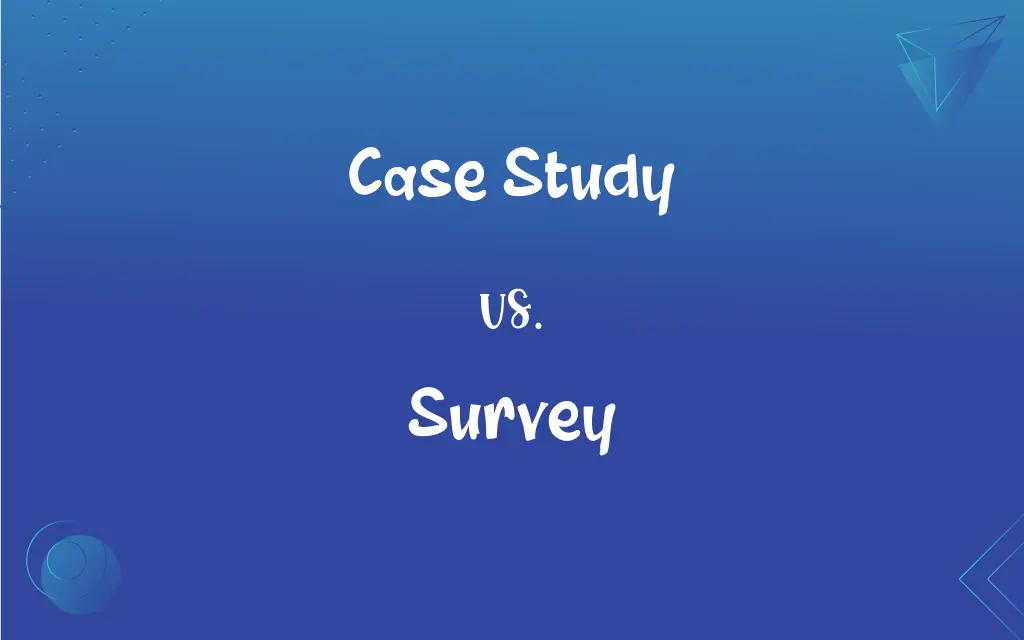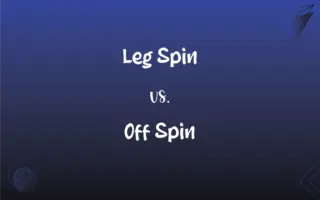Case Study vs. Survey: What's the Difference?
By Janet White || Published on December 17, 2023
A case study is an in-depth analysis of a specific subject, while a survey is a method of collecting data and opinions from a broad audience.

Key Differences
A case study involves a detailed examination of a single subject, such as an individual, event, or organization, to gain in-depth insights. In contrast, a survey is a research tool used to gather data from a sample population, focusing on gathering quantitative information or opinions through questions.
Case studies are often used in fields like psychology, sociology, and business, where a holistic understanding of a complex issue is needed. Surveys, however, are utilized across various fields to quickly gather data from many subjects, providing a broad overview of trends or attitudes.
In a case study, qualitative methods like interviews and observation are predominantly used, offering a rich, contextual understanding of the subject. Surveys, on the other hand, typically employ structured questionnaires, aiming for statistical analysis of the responses.
The depth of a case study allows for a comprehensive exploration of the subject, often leading to theory development or testing. Surveys, with their broader approach, are more suited for hypothesis testing and identifying general patterns across a large population.
Case studies provide detailed and specific insights but may lack generalizability due to their focus on a single case. Surveys, conversely, offer a broader perspective but may not capture the depth and nuance that a case study can provide.
ADVERTISEMENT
Comparison Chart
Focus
In-depth analysis of a single unit or subject.
Broad analysis of multiple subjects.
Methodology
Qualitative, often narrative.
Quantitative, often using questionnaires.
Data Type
Detailed, contextual information.
Statistical, numerical data.
Purpose
Understand complex phenomena in detail.
Gauge opinions or trends in a population.
Generalizability
Limited, as it focuses on one case.
Higher, due to larger, more diverse samples.
ADVERTISEMENT
Case Study and Survey Definitions
Case Study
A case study is an in-depth analysis of an individual or entity.
The psychologist's case study on the patient revealed unique behavioral patterns.
Survey
A survey is a method of gathering information from a group of people.
The survey indicated a high level of customer satisfaction.
Case Study
A case study is an intensive study of a singular instance or phenomenon.
The medical case study highlighted a rare genetic disorder.
Survey
A survey is an investigation of opinions or experiences of a group.
The employee satisfaction survey revealed insights into workplace morale.
Case Study
A case study is a documented study focusing on one specific case.
The company's turnaround was the subject of a Harvard Business School case study.
Survey
A survey is a research tool for asking questions and recording responses.
The market survey helped the company identify consumer preferences.
Case Study
A case study is a research method involving a thorough investigation of a particular subject.
Her case study on urban development was published in a leading journal.
Survey
A survey is a study conducted by distributing questionnaires.
The online survey was completed by over 500 people.
Case Study
A case study is a detailed examination of a specific event.
The case study of the 2008 financial crisis provided valuable economic insights.
Survey
A survey is a systematic collection of data from a sample population.
The national health survey collected data from thousands of participants.
Survey
To look over the parts, features, or contents of; view broadly
Surveyed the neighborhood from a rooftop.
Surveyed the shelves in the pantry.
FAQs
What is the purpose of a case study?
To gain detailed insight and understanding of complex issues in real-world contexts.
What is a case study?
A case study is an in-depth analysis of a single individual, group, event, or situation.
Can case studies be generalized?
Generalization is limited as they focus on specific cases.
Can case studies be biased?
Yes, if the researcher's perspectives or subjectivity influence the findings.
Are case studies credible?
Yes, if well-designed and transparently conducted.
How is data collected in a case study?
Through various methods like interviews, observations, document reviews, and sometimes questionnaires.
How long does a case study take?
Duration varies greatly, from a few weeks to several years, depending on complexity.
What is a survey?
A method of collecting data from a predefined group of respondents to gain information and insights on various topics.
Are case studies qualitative or quantitative?
They are primarily qualitative but can include quantitative elements.
What fields use case studies?
Business, education, social sciences, and healthcare, among others.
Are surveys qualitative or quantitative?
Primarily quantitative, but can include qualitative elements through open-ended questions.
How are survey results analyzed?
Using statistical methods to interpret data and derive conclusions.
What challenges are associated with surveys?
Issues like low response rates, biased samples, and inaccurately answered questions.
Can surveys predict behavior?
They can indicate trends and likelihoods, but not with absolute certainty.
What makes a good case study?
A clear focus, detailed data, and critical analysis relevant to the research question.
What types of surveys exist?
Various, including online, telephone, mail, and in-person surveys.
What is a good response rate for a survey?
Typically, above 30% is considered acceptable, but this can vary based on the survey type and context.
What is the purpose of a survey?
To gather quantitative data, understand trends, opinions, or behaviors of a population.
Can surveys be biased?
Yes, due to factors like question wording, respondent selection, and response rates.
How are surveys conducted?
By presenting a set of questions to respondents and collecting their answers.
About Author
Written by
Janet WhiteJanet White has been an esteemed writer and blogger for Difference Wiki. Holding a Master's degree in Science and Medical Journalism from the prestigious Boston University, she has consistently demonstrated her expertise and passion for her field. When she's not immersed in her work, Janet relishes her time exercising, delving into a good book, and cherishing moments with friends and family.






































































